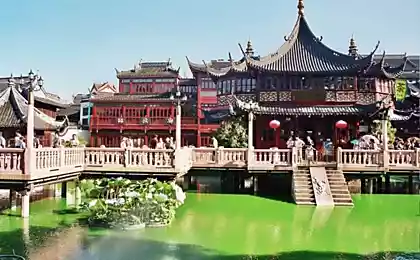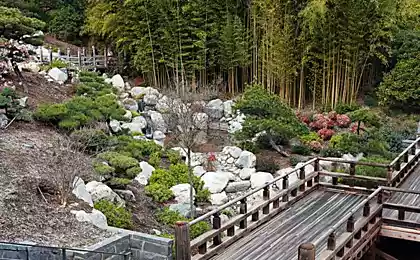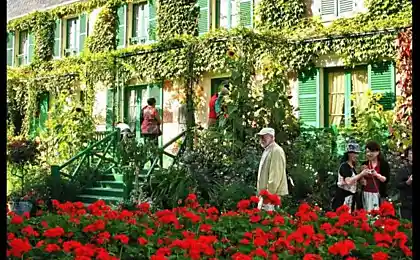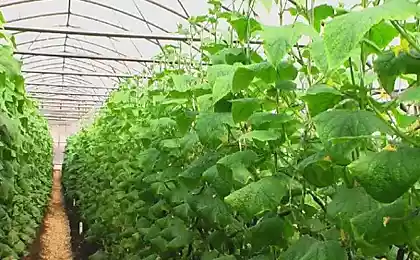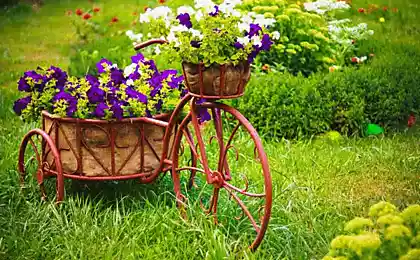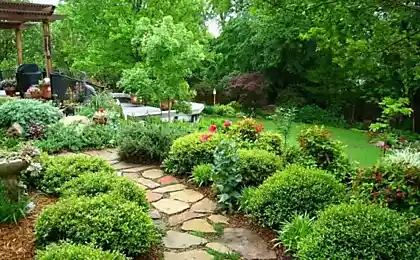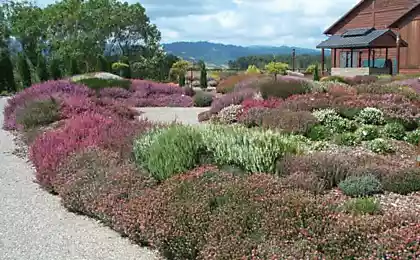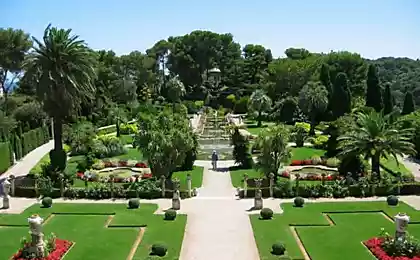461
Garden without pesticides — protection strategy
In recent years, the chemicals began to produce in small dosages. This circumstance, as well as ease of use did the “chemistry” means number one of all pests and diseases in our gardens. Much simpler: asked the shop: “The spray from the pollen beetle?” and bought a bag for 20 — 40 roubles. The costs are relatively small, and the result is seen almost immediately: the bugs fall dead. That's good, then the poison works.

But somehow we don't think about the fact that part of the poison goes into the fruit and deposited in the ground. The manufacturers of these chemicals claim that after some time all the harmful substances disintegrate. But is it true? Is it possible to believe such statements 100 %? And that break up the poisonous substances that are useful to us whether the products of this decay? Moreover, who can look forward: what will happen to our sites in 30-40 years, if this small piece of land from year to year to pour insecticides, fungicides, herbicides??? Plus mineral fertilizers, which also have chemical origins. All these and many other questions I asked myself when I began to treat your garden. Maybe I would be less bothered by these problems, but our family was always small children. First cousins who often visited us in the garden, and then their own children. It is known that even small amounts of harmful substances can cause a child severe poisoning or allergies, while in adults there is no reaction. This fact forced us to almost completely abandon the use of chemicals in your garden. In the autumn we have added phosphorus-potassium fertilizers for the ripening of the shoots of roses and fruit trees. Check yourself Many gardeners may ask: “But what about Apple pollen beetle? Because if you do not spray Apple trees, more than half of the flowers damaged by larvae.” And you try to conduct an experiment. One year to treat the trees, and in another year don't do it. Then compare the result. Of course, in the first case the fruit will generate more. But the ovaries will still fall off as the tree self regulates the load of harvest. Flowers always blooms with abundance. However, the tree can't feed such a number of fruits, so part of the “extra” ovaries resets. If apples are not sprayed, instead of “extra” drops off the flowers and ovaries are damaged by larvae. Ultimately, it is the same. In words, everything seems right. And what happens in practice? My parents tried to spray the trees regularly and I (when he became owner) stopped doing it because of the children. As a result of the fall apples ripen as much almost as before. If you conduct the exact account, then, maybe will a little less. But for a family (with my nephews) we have enough. A surplus of the fruit only creates problems with their processing. What is the focus? The inquisitive gardener will think, “How is it that the Apple harvest is about the same?” First, I already said that part of the ovaries a tree drops, to reduce its load. If the tree is not sprayed against pests, this project will make pollen beetle and moth. But they are also not able to eat all of the ovary. In my experience, never because of pests, we are not left without a crop. Secondly, when processing the crown insecticides killed not only harmful, but also useful insects. Among them are those that eat the same pledoarie and citedly. That is, without spraying we provide the opportunity for beneficial insects to protect the garden, and as a result save our crops. Thirdly, it is seen that garden, treated by chemotherapy, rarely visited by birds. At least in the days when the spraying in the trees. And in the spring to feed their Chicks birds are harvested from the trees a lot of pests, significantly reducing their numbers. Fourth, the gardens are now many sites which do not conduct spraying. Either the owners got old and can't do, or don't want, or areas just abandoned. The gardens of these pests safely move on the treated trees, when the action of the drug ends. Together, these four factors balance the odds to about the same crop of apples (and pears) in the garden with the processing of “chemistry” and without it. So whether you want to use it? I did not call to abandon it entirely, just suggesting to think about. But what about the berries? Worse is the case with large-fruited strawberries (Victoria). I tried not to spray her with insecticide and left almost no crop. Damn weevil destroyed most of the buds, and the first large berries. Concluded that without treatment is still not enough. And here came to the aid of biological agents. The waiting period they have much less than chemical means, and therefore, children can not worry. Let me remind you that the waiting period is the time during which the fruits cannot be gathered after spraying. When this period expires, the drug is considered harmless. On his land to combat Mattila-strawberry weevil we use fitoverm. You can also use akarin and bitoksibatsillin, just was always for sale. In case of strong pest concentration of the drug is recommended to increase. This is mentioned in the instructions. Black currant has often suffered from the invasion of aphids. Its too real to overcome fitogormony, as well as herbal infusions and with a solution of soap. With currant Bud mites are controlled by a we easier: annually in early spring (no later than April 10) collect tick-borne buds. Throw them in the compost not only to burn or to drown in the kerosene. Protection strategy To combat insect pests are trying to attract to your garden enemies (insects that eat or parasitize the pests). With this purpose, planted in the garden, plants that attract beneficial insects. Under the Apple trees, between bushes of currants and raspberries in a cabbage we grow calendula, meadow Daisy, blooming cilantro and carrots. On these plants the natural feed and live. Also a very important moment in the fight against insect pests — treat in their most vulnerable moment. And most importantly, as long as they do not have time to multiply. Strawberry weevil must be destroyed in the period when the pedicle has risen, but some buds still not segregated. At this time, on peduncles going to the maximum number of beetles where they are most accessible to drugs. Before they hide under the leaves, and “get” them harder. But as soon as the inflorescence becomes loose, beetles immediately begin to “cut” thin pedicels of buds. Consider that you are already late. “Tick-borne buds” need to collect before leaves on the currant. If the leaves appeared, the ticks are already out of the kidneys and lay their eggs. Performing this procedure annually, it is possible to successfully fight this pest. The aphid appears during the summer many times. Therefore, it is important to regularly inspect the bushes. As soon as the tips of shoots, we notice the first females resseliella, just sprayed them with some biological agent. It does not allow the aphids to reproduce, and it does no harm. How to beat sickness in addition to insects, plants threatened by disease. And the most common “infection” is a fungal infection. These include powdery mildew, and late blight, and leaf spot on roses... Against fungal diseases created the wonderful biological drugs: alien, gamair, gliocladium, fitosporin. Alternating their use (for the user), you can keep your garden clean and even forget about the blight. Good results can be achieved by treatment with a solution of Baikal EM 1. It is a biological product with a wide action. It is used as fertilizer, watering the soil, and as a means of boosting the immune system of the plants (watering and spraying on the leaves). One important note is to apply biological products have a preventive, that is, in advance, without waiting for signs of the disease. Against late blight should be sprayed repeatedly with an interval of 7-14 days. A very important moment in the fight against pests — carry out the treatment during their most vulnerable period. And most importantly, as long as they do not have time to multiply. published Author: A. F. Majdannikov, Kazan, Russia P. S. And remember, only by changing their consumption — together we change the world! ©
Source: sadovymir.ru/article/?ELEMENT_ID=1476&SECTION_ID=110

But somehow we don't think about the fact that part of the poison goes into the fruit and deposited in the ground. The manufacturers of these chemicals claim that after some time all the harmful substances disintegrate. But is it true? Is it possible to believe such statements 100 %? And that break up the poisonous substances that are useful to us whether the products of this decay? Moreover, who can look forward: what will happen to our sites in 30-40 years, if this small piece of land from year to year to pour insecticides, fungicides, herbicides??? Plus mineral fertilizers, which also have chemical origins. All these and many other questions I asked myself when I began to treat your garden. Maybe I would be less bothered by these problems, but our family was always small children. First cousins who often visited us in the garden, and then their own children. It is known that even small amounts of harmful substances can cause a child severe poisoning or allergies, while in adults there is no reaction. This fact forced us to almost completely abandon the use of chemicals in your garden. In the autumn we have added phosphorus-potassium fertilizers for the ripening of the shoots of roses and fruit trees. Check yourself Many gardeners may ask: “But what about Apple pollen beetle? Because if you do not spray Apple trees, more than half of the flowers damaged by larvae.” And you try to conduct an experiment. One year to treat the trees, and in another year don't do it. Then compare the result. Of course, in the first case the fruit will generate more. But the ovaries will still fall off as the tree self regulates the load of harvest. Flowers always blooms with abundance. However, the tree can't feed such a number of fruits, so part of the “extra” ovaries resets. If apples are not sprayed, instead of “extra” drops off the flowers and ovaries are damaged by larvae. Ultimately, it is the same. In words, everything seems right. And what happens in practice? My parents tried to spray the trees regularly and I (when he became owner) stopped doing it because of the children. As a result of the fall apples ripen as much almost as before. If you conduct the exact account, then, maybe will a little less. But for a family (with my nephews) we have enough. A surplus of the fruit only creates problems with their processing. What is the focus? The inquisitive gardener will think, “How is it that the Apple harvest is about the same?” First, I already said that part of the ovaries a tree drops, to reduce its load. If the tree is not sprayed against pests, this project will make pollen beetle and moth. But they are also not able to eat all of the ovary. In my experience, never because of pests, we are not left without a crop. Secondly, when processing the crown insecticides killed not only harmful, but also useful insects. Among them are those that eat the same pledoarie and citedly. That is, without spraying we provide the opportunity for beneficial insects to protect the garden, and as a result save our crops. Thirdly, it is seen that garden, treated by chemotherapy, rarely visited by birds. At least in the days when the spraying in the trees. And in the spring to feed their Chicks birds are harvested from the trees a lot of pests, significantly reducing their numbers. Fourth, the gardens are now many sites which do not conduct spraying. Either the owners got old and can't do, or don't want, or areas just abandoned. The gardens of these pests safely move on the treated trees, when the action of the drug ends. Together, these four factors balance the odds to about the same crop of apples (and pears) in the garden with the processing of “chemistry” and without it. So whether you want to use it? I did not call to abandon it entirely, just suggesting to think about. But what about the berries? Worse is the case with large-fruited strawberries (Victoria). I tried not to spray her with insecticide and left almost no crop. Damn weevil destroyed most of the buds, and the first large berries. Concluded that without treatment is still not enough. And here came to the aid of biological agents. The waiting period they have much less than chemical means, and therefore, children can not worry. Let me remind you that the waiting period is the time during which the fruits cannot be gathered after spraying. When this period expires, the drug is considered harmless. On his land to combat Mattila-strawberry weevil we use fitoverm. You can also use akarin and bitoksibatsillin, just was always for sale. In case of strong pest concentration of the drug is recommended to increase. This is mentioned in the instructions. Black currant has often suffered from the invasion of aphids. Its too real to overcome fitogormony, as well as herbal infusions and with a solution of soap. With currant Bud mites are controlled by a we easier: annually in early spring (no later than April 10) collect tick-borne buds. Throw them in the compost not only to burn or to drown in the kerosene. Protection strategy To combat insect pests are trying to attract to your garden enemies (insects that eat or parasitize the pests). With this purpose, planted in the garden, plants that attract beneficial insects. Under the Apple trees, between bushes of currants and raspberries in a cabbage we grow calendula, meadow Daisy, blooming cilantro and carrots. On these plants the natural feed and live. Also a very important moment in the fight against insect pests — treat in their most vulnerable moment. And most importantly, as long as they do not have time to multiply. Strawberry weevil must be destroyed in the period when the pedicle has risen, but some buds still not segregated. At this time, on peduncles going to the maximum number of beetles where they are most accessible to drugs. Before they hide under the leaves, and “get” them harder. But as soon as the inflorescence becomes loose, beetles immediately begin to “cut” thin pedicels of buds. Consider that you are already late. “Tick-borne buds” need to collect before leaves on the currant. If the leaves appeared, the ticks are already out of the kidneys and lay their eggs. Performing this procedure annually, it is possible to successfully fight this pest. The aphid appears during the summer many times. Therefore, it is important to regularly inspect the bushes. As soon as the tips of shoots, we notice the first females resseliella, just sprayed them with some biological agent. It does not allow the aphids to reproduce, and it does no harm. How to beat sickness in addition to insects, plants threatened by disease. And the most common “infection” is a fungal infection. These include powdery mildew, and late blight, and leaf spot on roses... Against fungal diseases created the wonderful biological drugs: alien, gamair, gliocladium, fitosporin. Alternating their use (for the user), you can keep your garden clean and even forget about the blight. Good results can be achieved by treatment with a solution of Baikal EM 1. It is a biological product with a wide action. It is used as fertilizer, watering the soil, and as a means of boosting the immune system of the plants (watering and spraying on the leaves). One important note is to apply biological products have a preventive, that is, in advance, without waiting for signs of the disease. Against late blight should be sprayed repeatedly with an interval of 7-14 days. A very important moment in the fight against pests — carry out the treatment during their most vulnerable period. And most importantly, as long as they do not have time to multiply. published Author: A. F. Majdannikov, Kazan, Russia P. S. And remember, only by changing their consumption — together we change the world! ©
Source: sadovymir.ru/article/?ELEMENT_ID=1476&SECTION_ID=110
Nicholas Badoev, the ICU doctor: about the "drunks" about the government and not only
Hormonal contraceptives can affect the structure of the brain women






